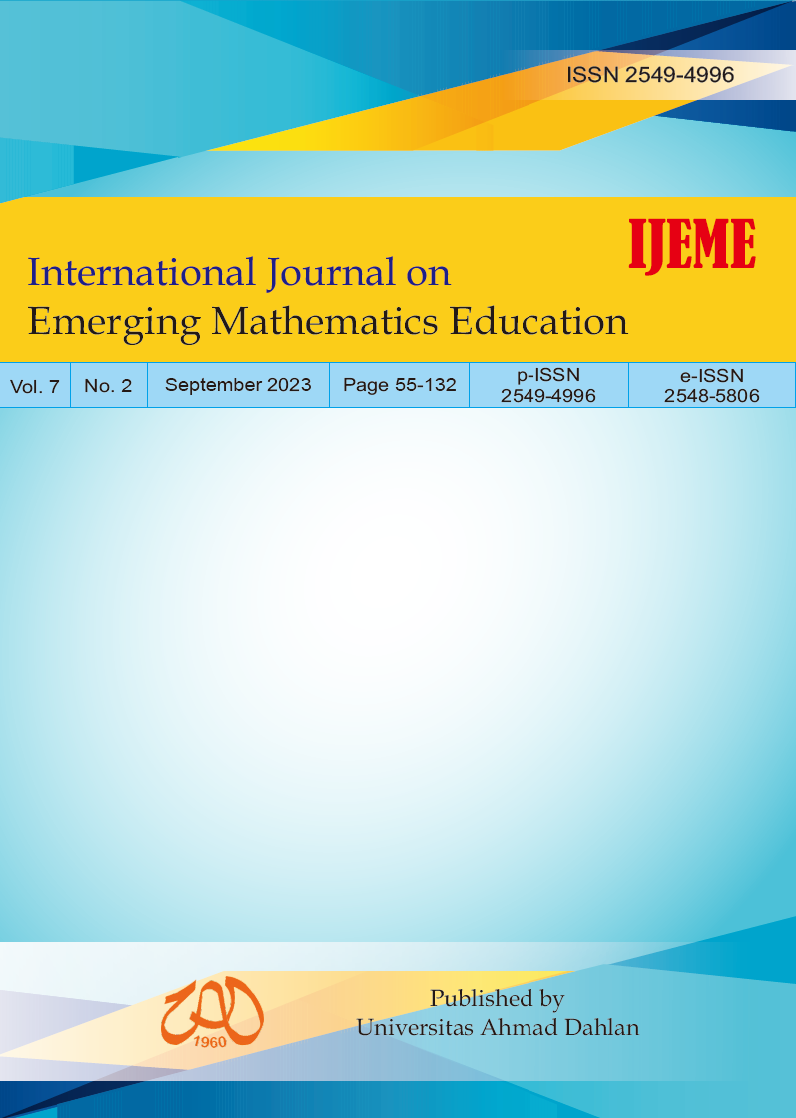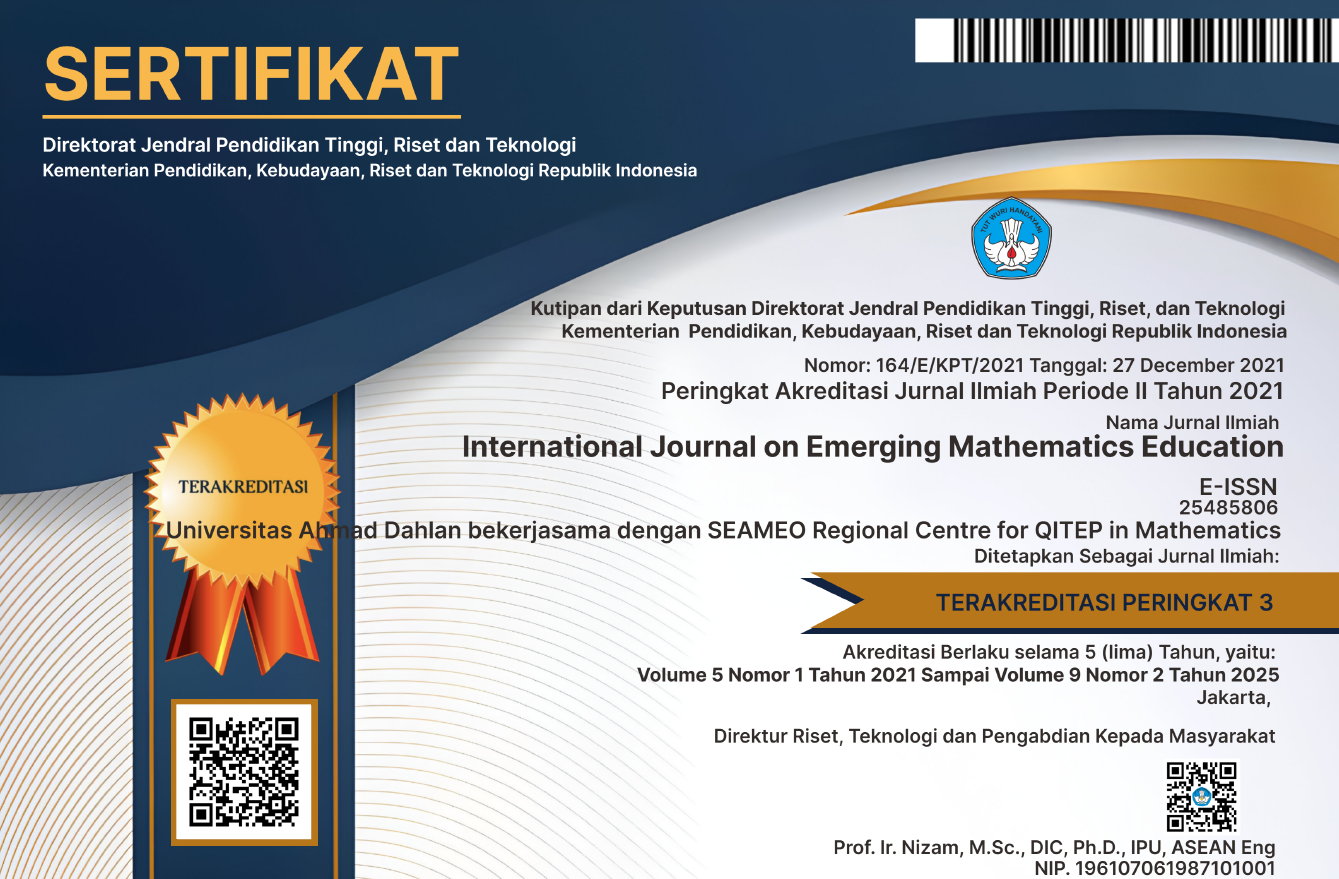Learning Linear Equation in Two Variables Using PBL-based E-worksheets for Grade VIII
DOI:
https://doi.org/10.12928/ijeme.v7i2.29584Keywords:
critical thinking skills, e-worksheet, PBL, linear equation in two variablesAbstract
One of the mathematics learning materials in class VIII, namely the system of linear equations in two variables, does not meet learning standards. One of the causes of students' critical thinking skills not being optimal is the lack of students' desire to ask questions. From the results of the pretest given by researchers to students, it appears that there are several errors in the system of linear equations in two variables equation material, namely that students are not able to model problems in mathematical form, students are also less capable. cannot fully apply the system of linear equations in two variables method. This research aims to develop an e-worksheet based on Problem Based Learning (PBL) to enhance students' critical thinking skills. Based on the validity test, e- worksheet with a valid PBL model is used for learning with an average material score of 4.53 and an average media score of 3.808. E-worksheets with the PBL model are said to be practical to use in the learning process based on an average student response of 4.134.References
Kusumaningrum, H., & Suparman. (2020). Designing Social Arithmetic Student Worksheets Using the RME Approach to Improve Critical Thinking Abilities, International Journal of Scientific and Technology Research, 9(3), 4978-4982.
Hairun, M.S.Y., & Suparman. (2020). Analysis and Design of PBL-Based Mathematics Student Worksheets to Improve Critical Thinking Skills, Universal Journal of Educational Research, 8(8), p.3310-3322.
Miles, M.B., & Huberman, A. M. (2014). Qualitative Data Analysis, Methods Sourcebook, 3rd Edition. USA: Sage Publications. Translated by Tjetjep Rohindi Rohidi, UI-Press.
Saputra, Nelva, H., & Salim (2020). Application of Teaching Materials Based on Critical Thinking Skills. Pedagogik: Journal of Education, 7(1), 22-46.
Sumarmin, R., & Basri, R. (2020). The Influence of the Problem Based Learning Model on the Critical Thinking Ability and Biology Competence of SMA 3 Pariaman Students. International Journal of Progressive Science and Technology , 23 (1), 274-279.
Umar, U., Kaharuddin, A., Fauzi, A., Widodo, A., Radiusman, R., & Erfan, M. (2020). A Comparative study on critical thinking of mathematical problem-solving using problem based learning and direct intruction. In 1st Annual Conference on Education and Social Sciences (ACCESS 2019), 314-316, Atlantis Press.
Downloads
Published
How to Cite
Issue
Section
License
License and Copyright Agreement
In submitting the manuscript to the journal, the authors certify that:
- They are authorized by their co-authors to enter into these arrangements.
- The work described has not been formally published before, except in the form of an abstract or as part of a published lecture, review, thesis, or overlay journal. Please also carefully read the International Journal on Emerging Mathematics Education (IJEME) Author Guidelines at http://journal.uad.ac.id/index.php/IJEME/about/submissions#authorGuidelines
- That it is not under consideration for publication elsewhere,
- That its publication has been approved by all the author(s) and by the responsible authorities, tacitly or explicitly, of the institutes where the work has been carried out.
- They secure the right to reproduce any material that has already been published or copyrighted elsewhere.
- They agree to the following license and copyright agreement.
Copyright
Authors who publish with the International Journal on Emerging Mathematics Education (IJEME) agree to the following terms:
- Authors retain copyright and grant the journal the right of first publication with the work simultaneously licensed under a Creative Commons Attribution License (CC BY-SA 4.0) that allows others to share the work with an acknowledgment of the work's authorship and initial publication in this journal.
- Authors are able to enter into separate, additional contractual arrangements for the non-exclusive distribution of the journal's published version of the work (e.g., post it to an institutional repository or publish it in a book), with an acknowledgment of its initial publication in this journal.
- Authors are permitted and encouraged to post their work online (e.g., in institutional repositories or on their website) prior to and during the submission process, as it can lead to productive exchanges, as well as earlier and greater citation of published work.
![]()
Ciptaan disebarluaskan di bawah Lisensi Creative Commons Atribusi-BerbagiSerupa 4.0 Internasional.





